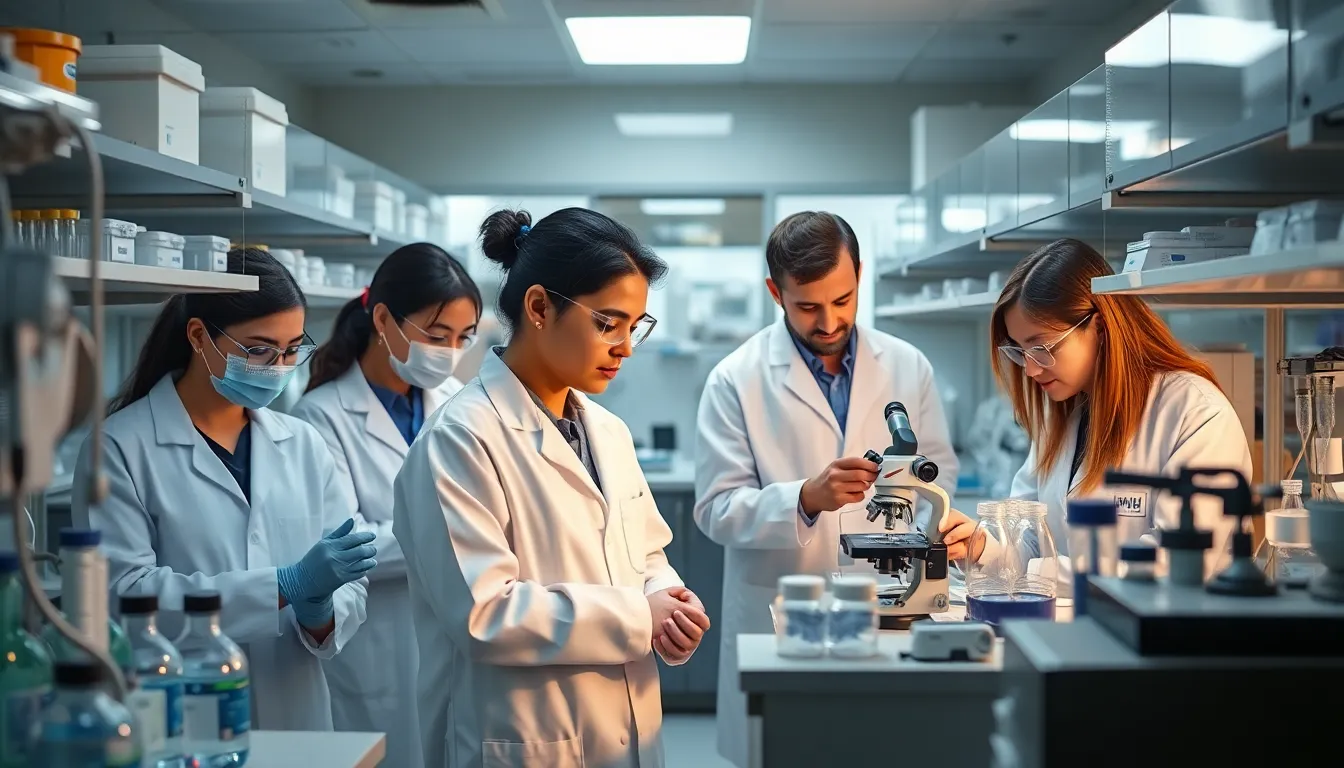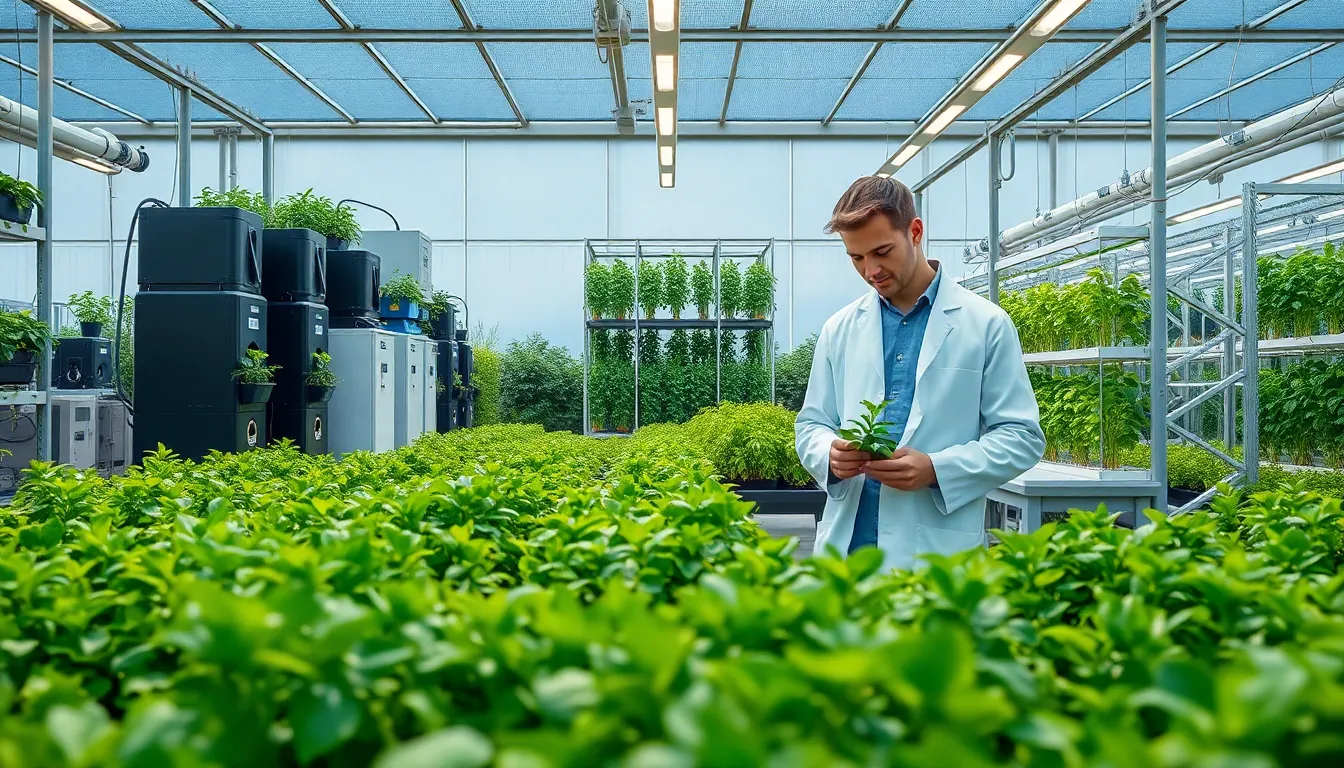In a world where science fiction often meets reality, biotech innovation is leading the charge. Imagine a future where diseases are tackled before they even start, crops grow with less water, and the food on your plate is both delicious and sustainable. This isn’t just wishful thinking; it’s happening right now.
Biotech is transforming industries faster than you can say “genetic engineering.” With breakthroughs occurring at lightning speed, it’s time to dive into the fascinating realm where biology and technology shake hands. From CRISPR to lab-grown meats, these innovations aren’t just changing the game; they’re rewriting the rules. Buckle up, because the biotech revolution is here, and it’s not just for scientists in lab coats anymore. It’s for everyone who enjoys a good laugh while marveling at how close we are to a healthier, smarter future.
Table of Contents
ToggleOverview Of Biotech Innovation
Biotech innovation encompasses a variety of technologies that merge biology with engineering and computer science. CRISPR technology enables precise gene editing, allowing for the modification of DNA sequences in living organisms. Lab-grown meats present a sustainable alternative to traditional livestock farming, aiming to reduce greenhouse gas emissions and animal welfare concerns.
Innovations in biotech address global health challenges, including antibiotic resistance and chronic diseases. Personalized medicine tailors treatments based on individuals’ genetic profiles, enhancing efficacy and minimizing side effects. Additionally, biotechnology contributes to renewable energy solutions through biofuels derived from algae or other organic materials.
Water purification technologies utilize genetically modified organisms to clean contaminants from water sources, significantly impacting environmental restoration efforts. Synthetic biology synthesizes new biological parts, organisms, and systems, leading to advancements in various fields.
Biotech innovations are not limited to labs; they influence agriculture through genetically modified crops that resist pests or tolerate drought conditions. These crops promise higher yields and reduced chemical use, promoting food security.
Recent studies indicate that the global biotechnology market is projected to reach $727.1 billion by 2025. This growth highlights the increasing importance of biotech innovations in addressing socioeconomic and environmental issues. Furthermore, the collaborative efforts of academia, industry, and government speed up the development and implementation of these technologies, ensuring a broad impact across multiple sectors.
As biotech innovation continues to evolve, it presents opportunities for groundbreaking solutions to some of humanity’s most pressing challenges.
Key Areas Of Biotech Innovation


Biotech innovation encompasses diverse fields transforming lives and industries. Innovations in healthcare, agriculture, and environmental solutions showcase the multifaceted impact of biotechnology.
Healthcare Advancements
Healthcare advancements center around personalized medicine and gene therapies. CRISPR technology leads to precise genome editing, addressing genetic disorders effectively. Cancer treatment benefits from biopharmaceuticals, tailoring therapies to individual patients. Moreover, diagnostics show significant improvements through biotechnology, enhancing disease detection and monitoring. The potential of wearable biosensors revolutionizes how individuals manage their health, enabling real-time data access. Regulatory frameworks evolve to accommodate these innovations, ensuring safety and efficacy for all users. This sector’s growth reflects broader trends, with the global health market projected to reach $637 billion by 2024.
Agricultural Innovations
Agricultural innovations focus on enhancing food production and sustainability. Genetically modified organisms (GMOs) increase crop yields while reducing the need for chemical fertilizers. Innovations in vertical farming leverage space and resources more efficiently, meeting urban food demands. Biopesticides offer eco-friendly pest control alternatives that protect the environment. Furthermore, advanced breeding techniques improve crop resilience against climate change. This shift capitalizes on biotechnology’s ability to address global food security concerns as the world population nears 10 billion by 2050. The agricultural biotech market is expected to surpass $26 billion by 2026.
Environmental Solutions
Environmental solutions leverage biotechnology to tackle pressing ecological challenges. Biofuels derived from algae and other renewable sources provide sustainable energy alternatives. Innovations in bioremediation utilize microorganisms to clean up contaminated soils and waterways. Further, genetically modified plants can restore habitats and improve carbon capture. Water purification technologies using bioengineered organisms enhance access to clean water globally. Collaborations between scientists and governments drive these solutions, illustrating biotechnology’s vital role in sustainable development. The environmental biotechnology market is anticipated to grow to $42 billion by 2026.
Challenges In Biotech Innovation
Biotech innovation faces several significant challenges that can impede progress. Both ethical considerations and regulatory hurdles stand out as major barriers to advancement.
Ethical Considerations
Ethical considerations greatly influence the direction of biotech research. Concerns arise around gene editing technologies such as CRISPR, especially regarding their influence on human embryos and biodiversity. Issues of consent become critical when genetic modifications affect future generations. Moreover, there’s ongoing debate about the potential risks associated with genetically modified organisms in agriculture and their long-term effects on ecosystems. This apprehension impacts public perception and acceptance of biotech innovations. A balanced approach is necessary, ensuring that advancements align with societal values while addressing ethical dilemmas.
Regulatory Hurdles
Regulatory hurdles also pose challenges to biotech innovation. Complex approval processes often delay the introduction of new products and technologies, especially in healthcare and agriculture. Navigating these regulations requires significant time and financial resources. The global regulatory landscape varies, creating uncertainty for international collaborations. Compliance with stringent guidelines can hinder rapid development and scaling of crucial innovations. Companies and research institutions must engage with regulators early in the process to streamline approvals and foster innovation.
Future Of Biotech Innovation
Biotech innovation stands at the cusp of monumental change, driven by groundbreaking technologies and a commitment to societal benefits.
Emerging Technologies
Gene editing tools such as CRISPR dominate the conversation, allowing scientists to modify DNA with unprecedented precision. Advances in synthetic biology enhance the design of microorganisms for various applications, including drug production and disease resistance. Additionally, advancements in microbiome research show potential for transforming healthcare through personalized treatments. AI integration in biotechnology optimizes research processes by analyzing vast datasets, expediting drug discovery. Furthermore, lab-grown meat production uses cellular agriculture, addressing the environmental impact of traditional farming. These technologies promise to revolutionize industries and significantly influence global health outcomes.
Potential Impact On Society
Biotech innovations are set to change lives dramatically, improving health and sustainability. Personalized medicine tailors treatments based on genetic makeup, increasing the efficacy of therapies and reducing adverse effects. Food security receives a boost as genetically modified crops enhance yields and minimize resource use, making them vital in a growing population. Water purification methods utilizing genetically modified organisms can provide access to clean water, improving public health. Environmental benefits arise from biofuels made through biotechnology, contributing to reduced reliance on fossil fuels. Society stands to gain substantially, living healthier and more sustainably through these advancements.
Biotech innovation stands at a pivotal moment with the potential to reshape industries and enhance quality of life. As breakthroughs like CRISPR and lab-grown meats gain traction, they promise to address critical global challenges. The fusion of biology with technology not only drives advancements in healthcare and agriculture but also offers sustainable solutions for environmental issues.
While ethical considerations and regulatory challenges persist, the commitment to responsible innovation is essential. Collaborations among academia, industry, and government will play a crucial role in navigating these complexities. The future of biotechnology is bright, with transformative possibilities that can lead to a healthier and more sustainable world for all.






